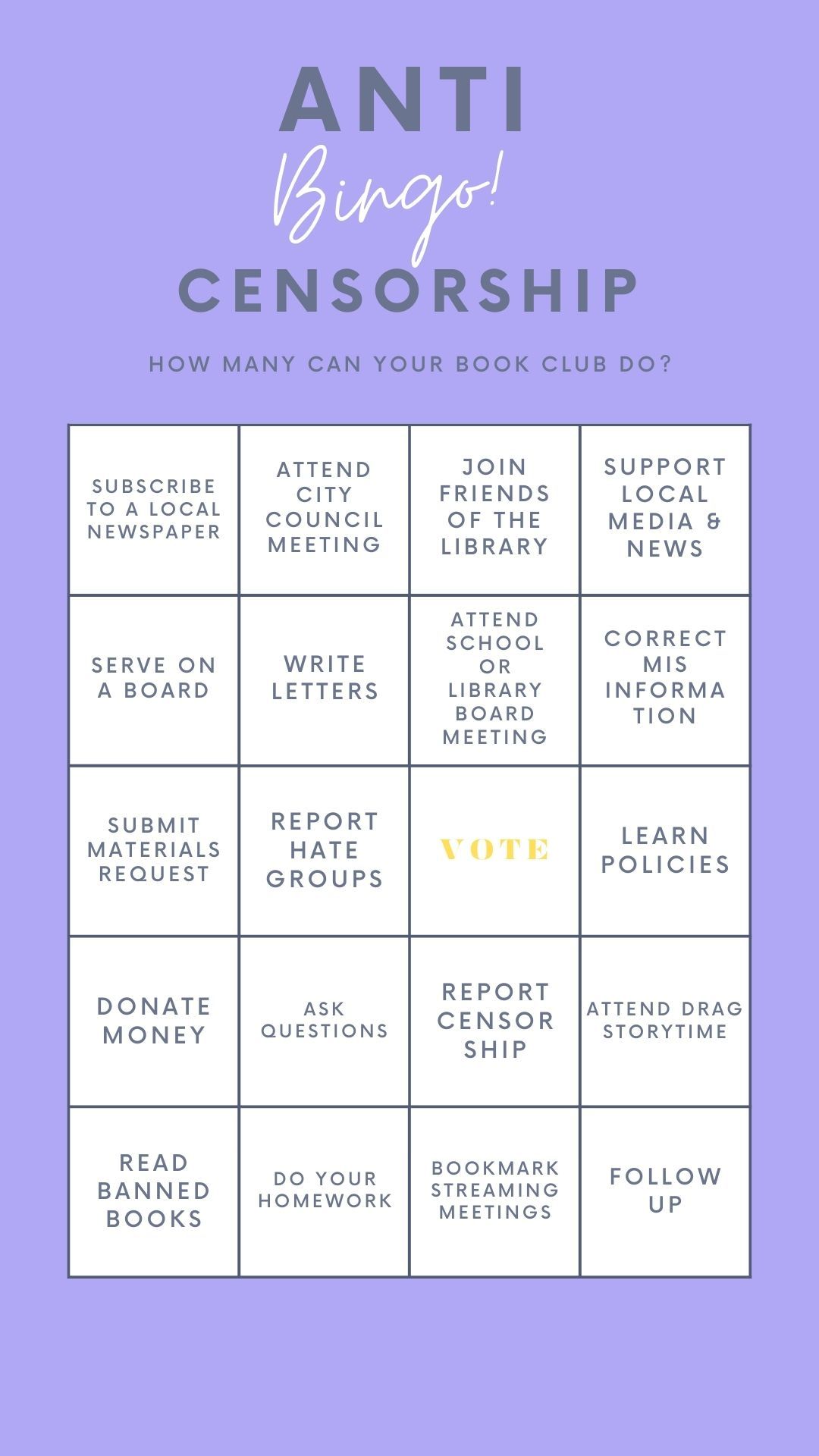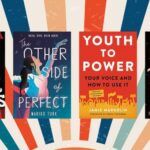
Banned Books BINGO for Book Clubs
Earlier this year, the American Library Association released data for the 2022 book challenges. There were more reported challenges than ever before in the 20 years since the ALA has been keeping track of censorship requests. The staggering 1,269 censorship demands almost doubled the 729 reported in 2021. Book bans and challenges like these aren’t new, but they certainly are multiplying. Librarians all over the United States are under attack, as are educators and booksellers. More than that, our First Amendment rights for intellectual freedom are under attack.
It’s more important than ever that we take initiative against those acting as gatekeepers on the public’s access to free information. The groups and individuals who are working to get books out of schools and off shelves are just that: groups and individuals. This is not a time to sit on our hands and anxiety spiral about the future of libraries and the imminent threat of fascism. There are steps we can take to combat censorship. We are also individuals who can form groups. In fact, many of you individuals are already in groups: book clubs, read-a-longs, and group chats. Petition the groups you are part of to do something.
During this year’s ALA annual conference, Ibram X. Kendi started the event by giving a call to action for people to become freedom fighters. It’s an intimidating term that feels impossible to achieve. But Kendi breaks the phrase down into a simple explanation that dispels any imposter syndrome we may feel around it. “There can be no greater compliment than to call a human being a freedom fighter. And if you’re fighting book bans, if you’re fighting against censorship, then you are a freedom fighter.” It’s both that simple and that complicated.
To get you started on your freedom fighter quest, let’s gamify actions you can take to combat censorship. Each square on this BINGO card may feel like it won’t make much of a difference, but together, each square adds up to big representation for big change.
Book Rioter Kelly Jensen reports regularly on censorship news and has made us an anti-censorship tool kit that was used as inspiration for this BINGO card. Her weekly round-ups are easy to read and extensively researched. Please take time to educate yourselves on what has been happening. While you’re at it, read about what rights students have to access books and the Right to Read Act.

Action Items:
Subscribe to a local newspaper/support local media news. The diminishing of local news outlets and newspapers makes it harder to know what’s happening in your community. Local reporting can help keep civil organizations in check. Some local news outlets have converted to completely online. Be sure to follow their social media and reporting.
Attend a city council meeting. Showing up for public government meetings lets your local leaders know that there are people in the community who oppose censorship.
Join Friends of the Library. Friends of the Library is a non-profit charity organization that partners with the library on their needs. Many public libraries have them.
Write letters. Write a letter to the editor of your local news outlet. The ALA even has templates you can use as a model or copy and paste directly.
Attend a school board or library board meeting. Just like with city council meetings, school board and library board meetings are often open to the public. It’s a place where your voice can be heard by the people making the decisions.
Serve on a board. If you don’t think the people on your school board or library board aren’t making the right choices, run for the board position yourself.
Correct misinformation. If you see a post or news story that has incorrect information about your library or their practices, correct it. Write a polite comment explaining the correct information or policy, or write a letter to the editor.
Submit materials requests. Many libraries have a system in place to hear about title requests from their patrons. Use this system to request books by LGBTQ+ authors, authors of color, and other underrepresented groups.
Report hate groups. It’s citizens in the community who know what’s going on first; report hate groups to local media and authorities.
VOTE. It really does make a difference, especially if you live in a place where school boards and library boards are elected. Find out what your representatives believe about censorship and vote accordingly.
Learn policies. Know where your local county, city, library system, and school district stands on censorship so you know what you need to fight to change or fight to maintain.
Donate money. Y’all get this one, right? If you’re able, money really helps. EveryLibrary is a great choice.
Ask questions. Ask your librarians, your representatives, your board members what they believe and where they want to see libraries in the future.
Report censorship. Did you hear about a book being pulled from the shelves of a school or public library? The ALA has a toolkit to help you report censorship.
Attend drag storytime. Or drag BINGO or any drag program being offered by the library. Attendance matters. It gives libraries important data they need to defend keeping these programs.
Do your homework. Check your sources. Read the policies. Pay attention to upcoming changes. This way, you’ll be able to speak out at board or council meetings against misinformation alongside other community members.
Read banned books. Just like being aware of your local policies, reading banned books means you’ll be able to speak from a place of information and experience rather than speculation about titles currently being challenged.
Bookmark streaming meetings. Just like in-person meetings, attendance at streaming meetings matters. Many streaming meetings also have a place where watchers can comment and ask questions.
Follow up. Check back about a title requested, send a follow up email about the letter to the editor you wrote, circle back with your local representatives. The squeaky wheel gets the grease.
Also check out How Your Book Club Can Fight Against Book Bans and Censorship!










